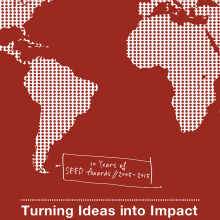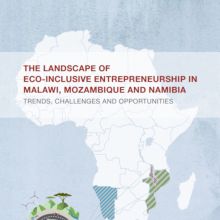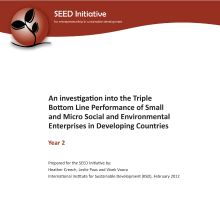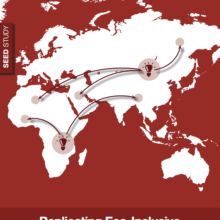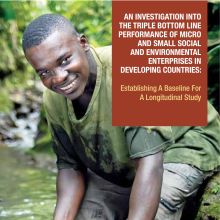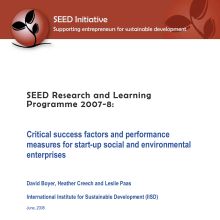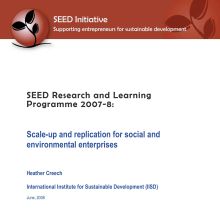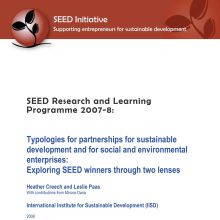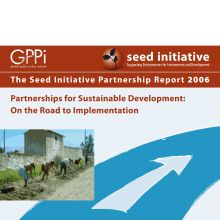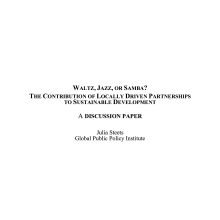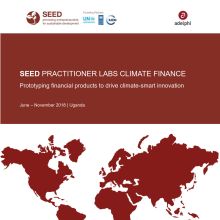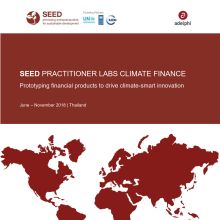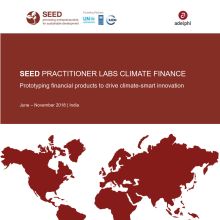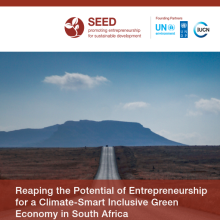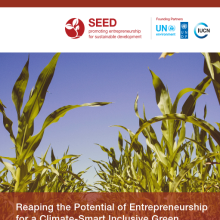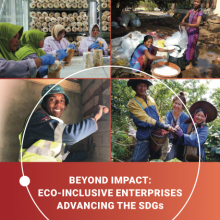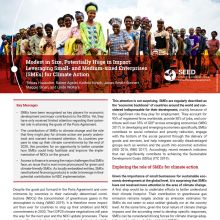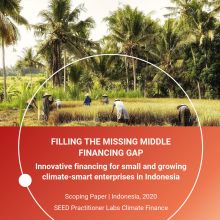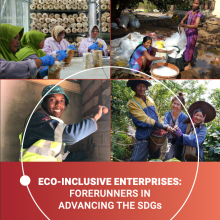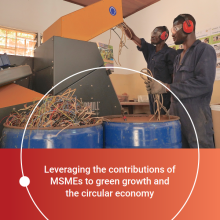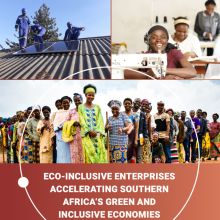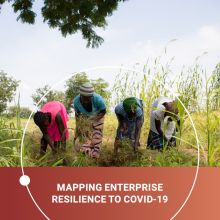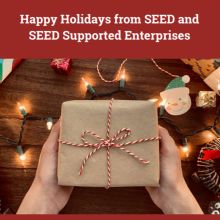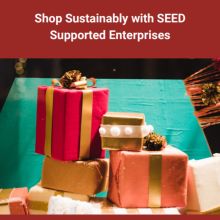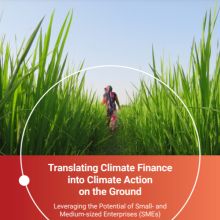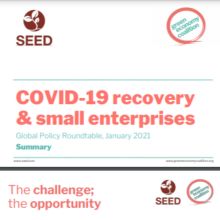Over the last ten years SEED has supported more than 200 social and environmental enterprises enabling collaboration and peer learning. SEED’s inspiring success story and significant key lessons have now been captured with a 10 Year Flagship Report.
One of the SEED focus areas for 2016 includes eco-inclusive entrepreneurship in Malawi, Mozambique, and Namibia. Eco-inclusive entrepreneurship is an important market-based solution for economies transitioning to sustainable growth trajectories while providing essential services for the marginalised populations of these emerging economies. This report is part of an effort to support the sector through improved research, building the track record for eco-inclusive enterprises and highlighting their ‘triple bottom line’ impact and contribution towards green growth.
This report draws insights from a three-year study of the performance of social and environmental micro enterprises and tackles two important questions. Firstly, whether and how micro and small social and environmental enterprises make contributions to social, environmental and economic progress within their communities; and secondly, what the enabling factors and barriers towards making such contributions are.
This report draws insights from a three-year longitudinal study of the performance of social and environmental micro enterprises and tackles two important questions. Firstly, whether and how micro and small social and environmental enterprises make contributions to social, environmental and economic progress within their communities; and secondly, what the enabling factors and barriers towards making such contributions are.
In the face of climate change, we urgently need to find pathways to a low-carbon economy. Only then can we improve the well-being of nine billion people by 2030 and achieve the Sustainable Development Goals (SDGs). Developing countries have to leap-frog to a low-carbon economy while continuing to improve well-being. Innovative eco-inclusive enterprises are already implementing low-carbon solutions while also providing social and economic benefits to those who need them most. This study shows how the replication of eco-inclusive entrepreneurial solutions tackles the double challenge of mitigating climate change and improving well-being, therefore arguing that they should be strategically incorporated in global and national plans for achieving a low-carbon economy.
This report draws insights from a three-year longitudinal study of the performance of social and environmental micro enterprises and tackles two important questions. Firstly, whether and how micro and small social and environmental enterprises make contributions to social, environmental and economic progress within their communities; and secondly, what the enabling factors and barriers towards making such contributions are.
This study provides insights into how eco-inclusive enterprises can enhance their social, environmental and business impacts and how policymakers can create a more enabling environment for such enterprises to thrive.
Eight critical success factors and fourteen performance indicators have been identified through the investigation of SEED Winners and other social and environmental entrepreneurs.
This paper explores how the international development community approaches scale-up and replication, and in particular its role in supporting start-up social and environmental enterprises with a view to expanding their business and their social and environmental impacts.
This paper suggests that developing partnership management is one critical success factor for social and environmental entrepreneurs but is not the defining modus operandi. It presents seven other critical success factors based on empirical evidence gathered from eco-inclusive enterprises.
- This report discusses trends and cross-cutting themes related to partnerships such as funding, organisation and accountability.
This report includes interpretation and commentary to stimulate debate on the role and potential of locally-driven partnerships for sustainable development.
This paper provides an analysis of the partnerships which applied to the SEED Awards in 2005 and demonstrates the wide variety of locally-driven entrepreneurial partnerships with the potential to contribute to sustainable development.
The 2018 SEED Practitioner Labs Climate Finance series in India, Thailand and Uganda brought together around 200 leading practitioners to jointly prototype tangible solutions to major climate finance challenges. This report summarises the innovative climate finance products developed as part of the SEED Labs process in Uganda in primary partnership with Swisscontact, UNFCCC Regional Collaboration Centre – Kampala, and FSD Uganda with UK Aid.
- The 2018 SEED Practitioner Labs Climate Finance series in India, Thailand and Uganda brought together around 200 leading practitioners to jointly prototype tangible solutions to major climate finance challenges. This report summarises the innovative climate finance products developed as part of the SEED Labs process in Thailand in primary partnership with Global Mangrove Trust with KX, Last of Ours with KX, South Pole and RCC UNFCC/IGES with UNDP.
- The 2018 SEED Practitioner Labs Climate Finance series in India, Thailand and Uganda brought together around 200 leading practitioners to jointly prototype tangible solutions to major climate finance challenges. This report summarises the innovative climate finance products developed as part of the SEED Labs process in India in primary partnership with TARA with Grameen Capital, New Ventures and GIZ with VNV Advisory.
The transition to a green, inclusive, and climate-smart South Africa requires collaborative efforts from the public sector, civil society, and private sector. As small and growing enterprises are an essential driver of growth, particularly in emerging economies, cross-sector partnerships to co-create an enabling environment for enterprises with inclusive and climate-smart business models are critical. This policy landscape paper provides a snapshot of the ecosystem in which eco-inclusive, climate-smart small and growing enterprises operate. By identifying areas where further support is needed, this paper is connected to the SEED Policy Prototyping Programme, in which stakeholders across sectors collaborate to co-create policy instruments designed to build a more enabling ecosystem for eco-inclusive entrepreneurs.
- The transition to a green, inclusive, and climate-smart Malawi requires collaborative efforts from the public sector, civil society, and the private sector. Micro, small and medium-sized enterprises (MSMEs) are important drivers of growth in Malawi, particularly in emerging economies, andmaking cross-sector partnerships are critical to co-creatinge an enabling environment for enterprises with inclusive and climate-smart business models. This input paper provides a snapshot of the ecosystem in which eco-inclusive small and growing enterprises operate. By identifying areas where further support is needed, this paper serves as an input to the SEED Policy Prototyping Programme, in which stakeholders across sectors collaborate to co-create policy instruments designed to build a more enabling ecosystem for eco-inclusive entrepreneurs.
- Small and growing enterprises are key drivers of development and employment. They account for 50% of the jobs globally, and contribute well over 35% towards the GDP of emerging economies. SEED particularly supports eco-inclusive enterprises; small, micro and medium-sized enterprises operating at the community level. They offer innovative solutions to common social and environmental issues, but also strengthen local economies. But what exactly is their impact? Can we quantify it, and how do we stimulate it? Have a look at our 2020 SEED Impact Snapshot, a snapshot of the impact of Asia an Africa based eco-inclusive enterprises on the SDGs.
- Despite the goals put forward in the Paris Agreement and commitments by countries in their nationally determined contributions (NDCs) the concentration of greenhouse gases in the atmosphere is rising (WMO 2019). It is, therefore, more important than ever for countries to step up their ambition and NDC commitments in 2020. The COP25 climate negotiations will pave the way for the next year and the NDC update processes. These open up the opportunity to acknowledge a modest yet potentially impactful group of players for ambitious climate action: small- and medium-sized enterprises (SMEs).
- This scoping paper provides the basis for the implementation of the collaborative, multi-step process of the SEED Practitioner Labs Climate Finance in Indonesia in 2020. Indonesia’s richness in biodiversity and vibrant landscape of small- and medium-sized enterprises (SMEs) present a significant opportunity for the country to meet its development objectives while reducing its climate impacts and improving climate resilience across sectors. In particular, climate-smart SMEs – offering products and services for climate change adaptation and/or mitigation – are well positioned to absorb and scale the environmental, social and economic impacts of global climate finance flows in line with Indonesia’s climate action objectives.
- As governments respond to the wide-ranging problems resulting from the COVID-19 crisis, it’s worth thinking about how we may take this opportunity to shift towards a green economy. Because the way we recover from this crisis will impact our fight against climate change and our progress towards achieving the 2030 Sustainable Development Agenda. A green recovery calls for investments in solutions that provide social, environmental and economic benefits to people, especially those in vulnerable and marginalised communities. SEED-supported eco-inclusive enterprises and other Micro, Small and Medium-sized Enterprises (MSMEs) already promote green-technologies while including low-income people in their value chain. The SEED Impact Snapshot helps to reveal the versatility of the impact of eco-inclusive enterprises. It also helps to clarify where there is the biggest potential for their SDG contributions and how policymakers may help unlock that potential further.
- As a leader in the ASEAN region, Thailand’s policy frameworks are well aligned with ASEAN initiatives, UN Sustainable Development Goals (SDGs) and Paris Agreement. Various stakeholders including those in the MSME ecosystem are working towards achieving the Thailand 4.0 industrial policy, a long-term vision to transition the country into an innovation-based economy, with a focus on technology, creativity and services. This policy landscape paper provides a brief overview of the social and environmental impact entrepreneurial ecosystem in Thailand. It serves as the background for the Practitioner Labs for Policy Prototyping hosted by SEED with UNDP Thailand as strategic partner.
- The policy context as it relates to MSMEs in Ghana is in a state of transformation. With a new MSME Policy on the horizon that seeks to align and coordinate efforts to support this stakeholder group, it is an opportune moment to look at the social and environmental contributions of MSMEs to Ghana’s development priorities, and how policy solutions can leverage these contributions. Furthermore, as MSME activities in specific sectors – for example in the waste management sector – receive increasing attention, there is opportunity for a coordinated effort to address challenges. By bringing together different perspectives and experiences, the SEED Practitioner Labs for Policy Prototyping provides an opportunity to build partnerships and holistic solutions.
- Micro, Small, and Medium Enterprises (MSMEs) provide 50% of jobs, contribute to over 35% of the GDP in emerging economies, and overall make up 90% of registered firms across the world. They are especially impactful in emerging economies as they work toward inclusive growth and equality for marginalised populations. At SEED, we focus on growing eco-inclusive enterprises which in turn contribute socially, economically, and environmentally to empowering the 5.2 billion people at the bottom of the pyramid worldwide. This report examines the yearly impact of 80 of our eco-inclusive enterprises in three of our SEED countries: Zambia, Zimbabwe, and Malawi. These locally embedded enterprises, 51% of which are women-led, demonstrate that driving the Sustainable Development Goals (SDGs) can indeed be profitable and with a success rate of 82.5% still in business, they show long-lasting impact in each of their communities and sectors.
- Resilience is an indispensable tool to help MSMEs prepare for the unknown, especially now when COVID-19 induced curfews and lockdowns expose MSMEs to new vulnerabilities. With fewer resources and access to information than larger companies, MSMEs in emerging markets have experienced severe disruptions to their businesses, with around 42% worldwide facing potential failure within six months. This report demonstrates how MSMEs, particularly eco-inclusive enterprises, are weathering the COVID-19 pandemic and how governments and intermediaries can lend support. In this report we outline six essential resilience factors and good practices that SEED’s eco-inclusive enterprises have employed in emerging markets. Our SEED enterprises serve as an excellent example of how other enterprises can incorporate resilience into their business models in the face of the pandemic and to become more adaptable for future shocks.
- The holidays are approaching and like many others around the world, SEED is searching for a way to send gifts and joy to our loved ones from a safe social distance.
- To better support small businesses when you're looking for a unique gift for your friend or family member, we encourage you to shop from our gift guide of eco-inclusive SEED supported enterprises! From home decor to handbags, from fair-trade products to face masks, there’s something in it for everyone!
- Read the report to learn more about how SMEs in emerging economies help their local communities adapt to and mitigate the impacts of climate change, and how this community engagement paves the way for providing secure livelihoods and a more sustainable future for all.
In January 2021, SEED and the Green Economy Coalition held an online, interactive roundtable gathering small enterprise networks, policy practitioners, NGOs and think tanks to exchange knowledge and share interventions on how to ensure that our Green Recovery efforts are impacting small businesses.

